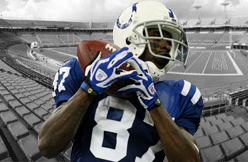Dec/14/12 08:32 AM Filed in:
Reggie WayneIt took Reggie Wayne four years to arrive. For a while, it looked as though the Colts’ 2001 first-round pick might be a bust. He caught just 76 passes in his first two seasons combined, in part because in those years the Colts were throwing more to their backs and tight ends. But in 2004, Wayne emerged as the team’s home run threat with 12 touchdowns, and for five seasons he and Marvin Harrison made up the league’s most dangerous receiving duo.
When Harrison left the game prior to the 2009 season, many predicted Wayne would experience a drop-off in production; he didn’t. When Peyton Manning was forced to sit out the 2011 season with an injury, many said Wayne would not be the same player, but he held up fine. The slow-to-arrive wideout has put together very strong numbers for his career, and this season might be his best to date. Because he has been consistent for more than a decade now his biggest supporters are setting him up for a run at Canton. Here is his résumé stacks up …
Statistics: Counting this year, Wayne has eight 1,000-yard seasons and should reach the 13,000-yard mark this weekend. He is 44 catches shy of reaching 1,000; at present, there are only eight members in that club, although only one (Jerry Rice) is in the Hall of Fame. Wayne set a single-game best for receiving in 2012 with a 212-yard game against the Packers and could become the first player to reach 200 targets in a season (statisticians began tracking targets in 2006).
Success: Wayne has been a part of 10 winning seasons during his 12-year career. Credit Manning for that more than anyone else, but Wayne was certainly one of the Colts’ key players in that long run of success. Wayne’s 53-yard touchdown reception in the first quarter of Super Bowl XLI helped swing the game back to Indianapolis, helping him and his teammates claim a ring.
Accolades: This is the area where Wayne’s candidacy is weakest, perhaps. He has been voted to five Pro Bowls (likely a sixth after this year) and has made the All-Pro team only once. He has led the league in receiving yards only once (2007), never in catches or touchdowns. Other than that, Wayne’s career lacks highlights. He’s been a steady producer, but someone lacking the big moments and seasons that help a Hall of Fame candidate stand out.
HOF comparison: John Stallworth
Both Stallworth and Wayne have had to live in the shadow of a more popular teammate (Lynn Swann for Stallworth, Harrison for Wayne) but arguments could be made that Stallworth and Wayne were the better all-around receivers. Stallworth also aged well, like Wayne; his finest year came in his 11th season (1984) when the Steelers legend set personal bests in catches (80), yards (1,395) and touchdowns (11).
Intangibles: One thing that will help Wayne’s candidacy is that his numbers have not dropped off much these past two years without Manning under center. His early critics credited Manning for much of Wayne’s success, but the fact the Wayne had 75 catches for a two-win team in 2011, and that he might set personal bests with a rookie quarterback this year suggests those critics were wrong. Wayne’s candidacy also might be helped by his durability — he hasn’t missed a start since entering the lineup full time in his third season — and his longevity. At 34 he has shown no signs of decline.
First-ballot candidate: No
HOF probability: 60 percent
Same as is true with quarterback, the requirements wide receivers must satisfy to enter Canton will change in the coming years. There is so much passing, and so many 80-catch wide receivers that the standards once used to separate the very good from the elite no longer apply. Even so, by the time Wayne becomes eligible, having 1,000 catches and more than 13,000 yards still will carry plenty of weight in the minds of voters.
Wayne is not a first-ballot candidate, and probably will need to be patient; in recent years players like Cris Carter, Tim Brown and Andre Reed have been forced to wait, and all three probably had better careers than Wayne.

(profootballweekly.com)



